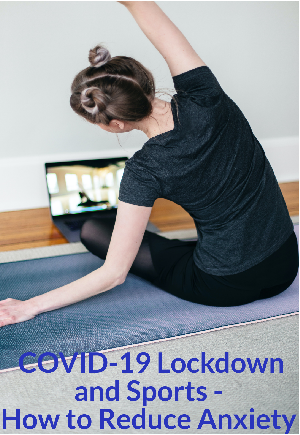COVID-19 Lockdown and Sports - How to Reduce Anxiety
COVID-19 Lockdown and Sports - How to Reduce Anxiety

If you are like most families with young children, these past few weeks have been filled with playing simple games, such as who can run the fastest from one side of the room to the other, or who can accurately recite the alphabet backwards. When my children were young, their favorite game involved my hiding their stuffed animals in the house. Then they would head off on a search and rescue mission to find their favorite “friends.” Now they are much older but back home due to the Coronavirus, but they still find comfort and joy in games from their youth, such as Wii MarioCart and Dance Dance Revolution.
During this lockdown, the importance of games has become clearer than ever. I’m sure in your home too, trying to occupy the anxious mind of you and your child(ren) has become even more vital. Games can occupy our chatter-filled minds, cut through the boredom of being quarantined, keep our awareness in the present moment, create a shared adventure, and challenge ourselves to improve in some way.
I remind the athletes I work with that the games they play are more complex (and expensive) than most games, but they are at root, just games.
And, during this time of crisis, when gyms are shuttered, some parks have been deemed off-limits, and athletic events have been cancelled for who knows how long, athletes, more than ever, need to appreciate the distinction between their sport goals (what they want to achieve) and their purpose (why they are playing). Although some use the terms goal and purpose interchangeably, they are not the same. For instance, the goal in tennis is to win, but the purpose is to enjoy the mind-body gifts that derive from playing.
Regrettably, COVID-19 has forced every athlete, from recreational to professional, to reassess their immediate sports goals, and search for new purposes. I have watched the doubt and negativity rise among many athletes and exercisers, who are intimately aware that their training and competing is as much for their mental muscles as it is their physical prowess. Despite all the bad headlines, I remind them of the good news which is that the virus can’t infect an athlete’s insatiable need to find games to play, and novel adventures to give them a daily spark.
At the heart of it, that’s why we play sports—to connect to something inside us that is curious and adventuresome, and that gives us a rush of excitement and a sense of aliveness (which our jobs may not necessarily provide). That’s what we mean by purpose; to see if we can improve in something important to us, to experience the flow of adrenaline as we push ourselves to move outside our comfort zone, and to “watch” ourselves grow and develop. It bears repeating that the benefits are as much mental as they are physical. As author and lifelong runner Scott Douglas puts it in his book, “Running is my Therapy,” “Running “makes (my) life more livable, run by run, day by day.” Douglas cites study after study showing the benefits of running for those who are anxious, depressed, moody, perfectionistic, injured, unmotivated, or self-critical. Douglas would know. He acknowledges how much even casual jogs around the neighborhood have helped him and his own struggles with depression.
Although our original athletic goals are now on hiatus, COVID-19 can’t stop us from creating new challenges that incorporate some of the same purposes, perhaps in a new form. A professional ballerina, who has been dealing with the 180-degree shift from intense rehearsals and performances to life back in her childhood home, has set a new goal of teaching on-line classes for young ballerinas at the studio where she herself trained. Under ordinary circumstances, she would not have had the time to “give back” to the studio that she credits for her success. However, the current circumstances led to her finding a new sense of “aliveness” in being of service to others. In that way, she has remained connected to the world of dance, but instead of focusing on her own performances she has embraced the challenge of teaching what she knows to young ballerinas. If she wasn’t willing to adjust her goals, she might never have experienced the sheer mood-boosting pleasure of giving young girls the gift of her expertise.
Many of my Type-A triathlete clients who watched their season’s races get cancelled one after the other are finding that now is an opportune time to shift their focus to maintaining overall fitness rather than worrying about their race preparedness. To that end, many are enjoying different kinds of virtual work-out classes, like Cardio Dance and Kick Boxing where they can enjoy being beginners again. Some immediately see that their frustration and lack of acceptance of the current circumstances in sport is making them unhappy. Some, however, need convincing that a temporary shift away from specific triathlon training to try something new is worth it. One dad realized the benefits when he recruited his 16-year-old son to try kick-boxing classes with him. What better father-son activity could there be? I’m happy to report that he’s experiencing a feeling of filial connectedness that he acknowledges even his best triathlon result couldn’t provide.
Of course, right now “winning” in sports may not be directly about getting a trophy or improving your ranking, but rather inventing new games that allow for new ways to boost your mood and enjoy the process of participating and growing. The world is changing, and we need to adjust and find new goals that can still keep us in the game.












